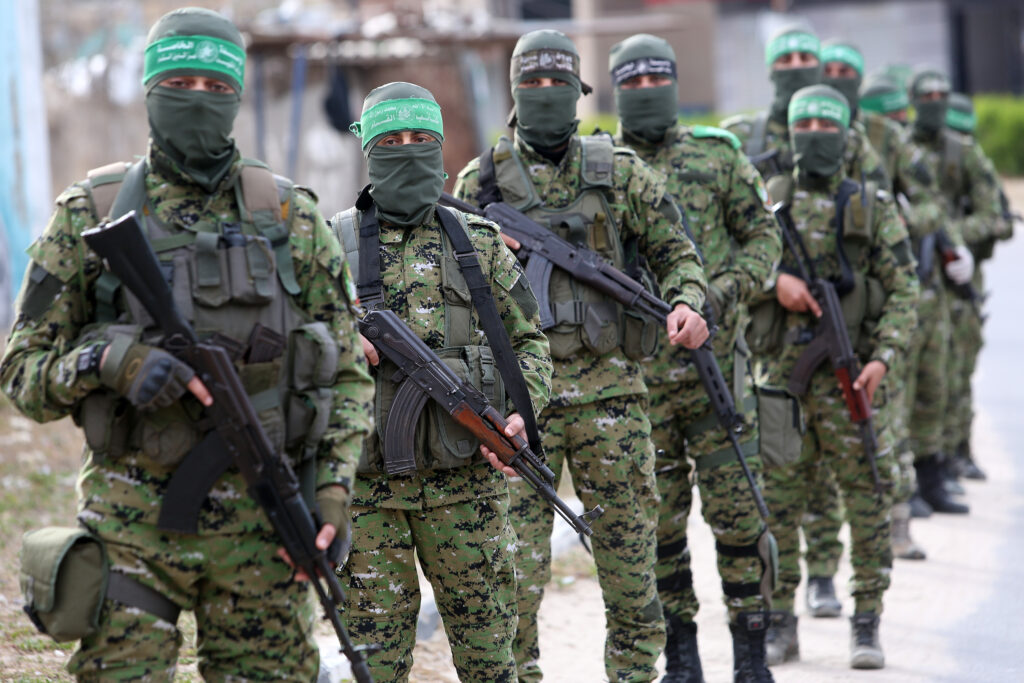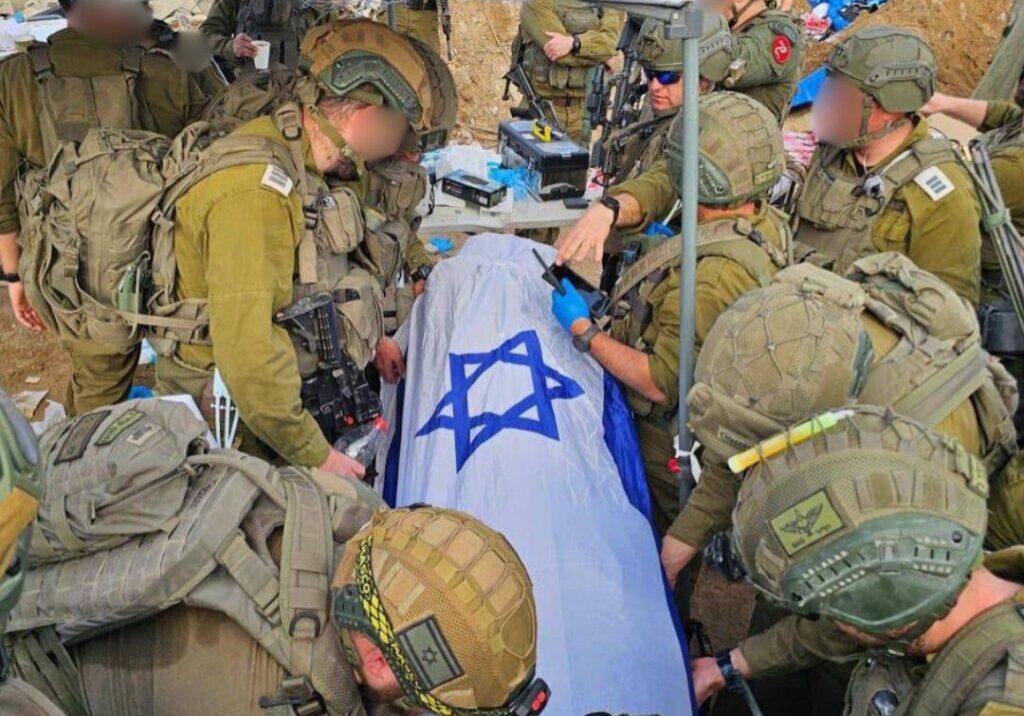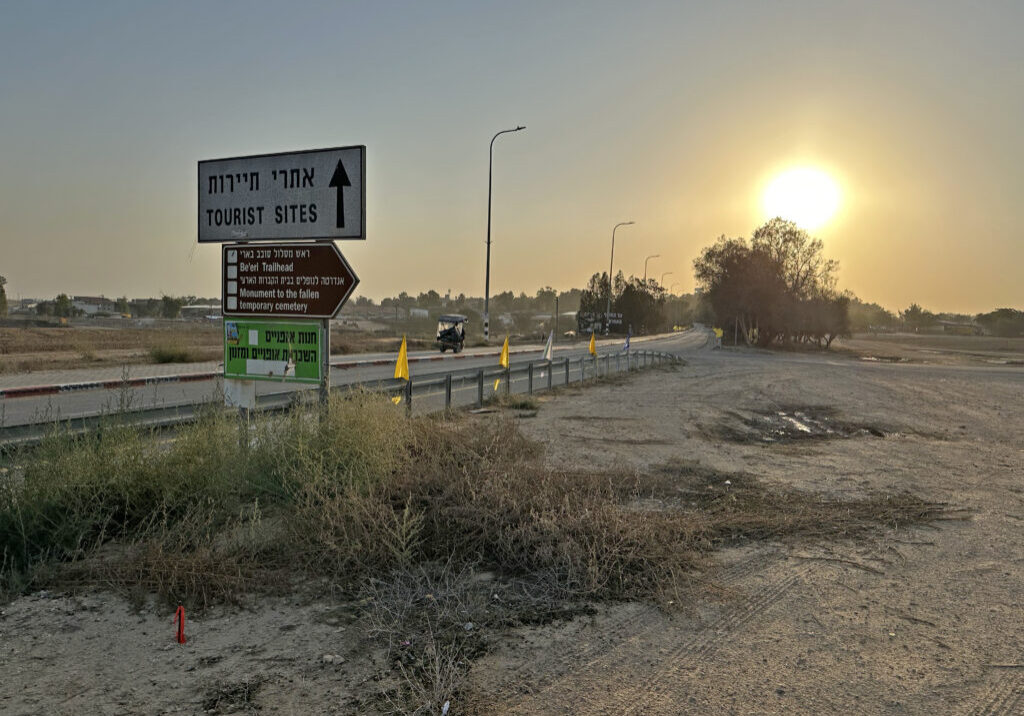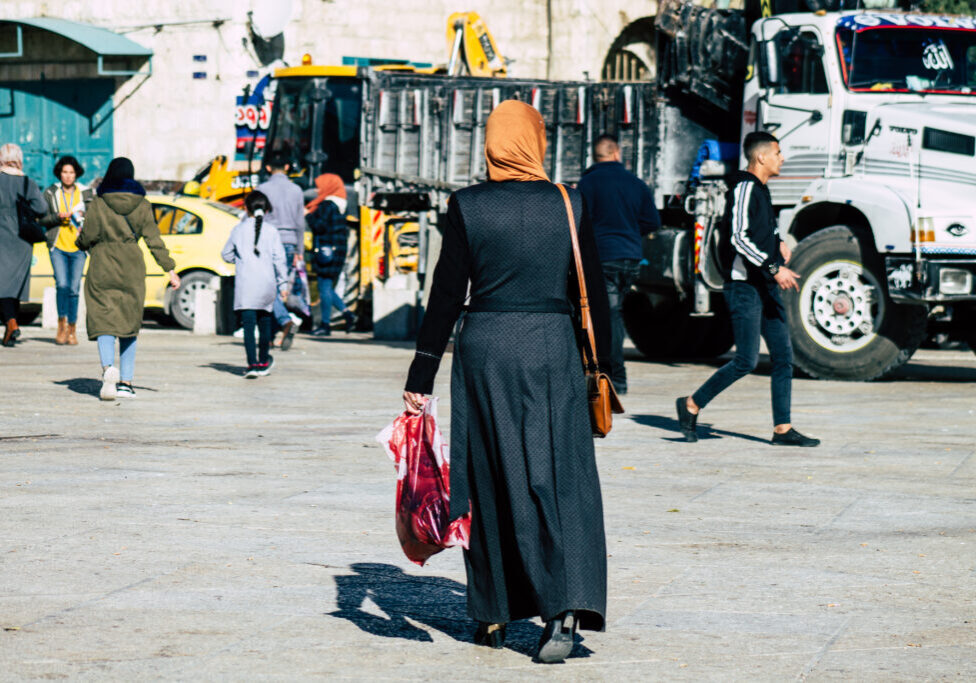Australia/Israel Review
Inside Hamas-stan
Aug 14, 2024 | Gianluca Pacchiani

A Palestinian dissident speaks out
BERLIN – In 2019, Gazan activists Hamza Howidy and Amin Abed organised and participated in demonstrations against the harsh living conditions in the impoverished Strip. They were both arrested by Hamas and placed in the same prison cell. Every day, they were subjected to beatings and torture.
Last August, Howidy, 26, managed to leave Gaza after another round of protests and another detention. Abed, 35, stayed behind, unable to afford the exorbitant exit fees from the enclave, and unwilling to let his beloved Gaza collapse further under the weight of Hamas’ mismanagement and repression. Even after October 7, Abed refused to remain silent in the face of the devastation that the terror group brought upon Gaza. in July, the well-known activist, a longstanding thorn in Hamas’ side, published a Facebook post in Arabic excoriating the Islamist group for its onslaught against Israel. “Hamas knew from the very first moment [that Israel would retaliate], but it was ready to give anything in return for the continuation of its rule, the hen that lays golden eggs for its leaders and its investments abroad,” a paragraph in the post read.
Shortly after publishing it, Abed was assaulted by more than 20 “thugs” – Hamas security members, according to bystanders – wearing masks and wielding batons and knives in the school where he was sheltering with his family. His arms and legs were broken.
“Amin [Abed] is the bravest Gazan you could ever meet,” said Howidy of his audacious friend and former cellmate, in an interview with the Times of Israel. “He was never afraid of Hamas. Whenever we thought of organising a protest, he was the first one to post about it, to speak up. He dedicated everything to opposing Hamas,” Howidy said. (Following his assault, Abed said in a recent interview he is now considering leaving Gaza as well.)

Gazan activist Hamza Howidy (Screenshot)
Howidy lives today in Germany, where he arrived a few months ago and submitted an asylum application. He receives shelter and a stipend from the German government. Safe from Hamas’ retaliation against himself and his family – who in the interim lost their home in an Israeli airstrike and have also left the Strip for Egypt – Howidy is now a vocal Hamas critic on the international stage. He maintains an English-language X (Twitter) account where he documents the suffering of Gazan civilians at the hands of both Hamas and the IDF. He has also penned a number of op-eds in prominent magazines, chief among them Newsweek, and given interviews to international media outlets describing Hamas’ terror rule over Gazans and chastising self-professed liberals on Western university campuses for hurting Palestinians by absolving Hamas of its crimes against them.
During a trip to Berlin from the undisclosed German town where he temporarily resides, Howidy sat down with the Times of Israel to describe in detail his experience as a Hamas dissident in Gaza, and to refute Western misconceptions about the terror group and his fellow Gazans.
“I often hear Israelis asking Gazans why we did not oppose and overthrow Hamas. You can see what happened to Amin Abed for writing a Facebook post. So just imagine the consequences for going to a protest,” he said. “It could get you killed.”
“But I feel deeply about my country, and I don’t want it to be depicted as full of terrorists and terror supporters. I want people to see the other side,” he continued. “We have moderate people like every other country, but we don’t have the opportunity to speak, nor the protection.”
Behind his decision to expose himself on international platforms is the knowledge that he is a pioneer. “I believe that Gazans first want to see someone start to make his voice heard, and others will follow,” he said.
The ‘We Want to Live’ protests
In 2019, hundreds of Gazans took to the streets demanding better living conditions in what became known as the “We Want to Live” (Bina Na’ish) rallies. Hamas security forces brutally suppressed the marches, beating demonstrators and detaining more than 1,000. Howidy and Abed were among them.
“The protests did not have leaders and were not explicitly political,” Howidy said. “To be honest, we wanted to overthrow Hamas, but we couldn’t say it out loud publicly, so we demanded a reconciliation between Hamas and Fatah, and fresh elections.”
Hamas security forces were swift in clamping down on the demonstrations. To disperse the masses of protesters, they opened fire into the crowd, Howidy recalled. “People started running for their lives. After shooting, the militia came with batons and started hitting as many as they could. And then they arrested us,” he said.
Howidy managed to get out of prison after three weeks thanks to a US$3,000 bribe paid by his relatively wealthy family – an exorbitant sum in the enclave, where the average monthly salary was then circa $400-500.
Others were not so fortunate. Many of those detained spent eight or nine months behind bars, and Abed was in jail for a year. Howidy estimated that his friend must have been arrested by Hamas at least ten times, and had his arms and legs broken twice before.
Howidy maintained that Hamas’ brutality, then as now, is a symptom of its weakness. “Hamas are afraid. They know that people are angry and want to replace them, but are too scared to protest because they know how Hamas would respond. We have tried many times.”
A lifetime under Hamas’ brutality
The 26-year old grew up in Gaza City’s Rimal neighbourhood, in what used to be one of the most upscale areas in the Strip, and for that reason was home to various Hamas leaders. The terror group’s chief Yahya Sinwar used to live a 15-minute walk away from his home, and Ahmad Bahar, another prominent official killed in an Israeli airstrike in November, also resided nearby. Howidy was only nine years old when, in June 2007, Hamas wrested power over the coastal enclave from the Palestinian Authority (PA) after winning a majority of seats in the Palestinian legislative elections the previous year. After the coup, Hamas took to executing dozens of members of Fatah, the secularist party that runs the PA. About 600 Palestinians were killed over the course of few weeks in the internecine fighting between the two factions.
“I was young, but I remember the violence. When they took control over Gaza, Hamas started coming for the Fatah people,” Howidy said. “They tied their bodies to their motorcycles and dragged them in the streets of my neighbourhood,” he recalled. “It was a nightmare. Their goal was to shock the people by exposing them to the worst possible brutality so that they would remain silent for a long time,” he said.
The spectre of Hamas’ savagery loomed large in the everyday life of Gazans. When Howidy was arrested for the first time in 2019, his detention was relatively short compared to that of some of his friends. However, Hamas jail was a frightful place. “Three weeks of being beaten daily and tortured is a very, very long time. When people in the West think of prison, they think of calling a lawyer and a trial in court. In Gaza, we were under a terrorist regime; we had none of that. Your family cannot visit you. You don’t have any idea what’s going to happen to you.” Howidy said.
Hamas fabricated charges against him, as well as against other detainees. “They accused us of the most ridiculous things. For instance, for the first few days, I was accused of collaborating with Israeli authorities. Then they accused me of working with the PA. And then in the last days, I remember them telling me I was financed by the UAE. I was like: What the f***! I only protested because I want a job!”
Anti-Hamas protesters again thronged the streets of Gaza in the summer of 2023 demanding an improvement to the dire living conditions under the same slogan, “We want to live,” an event barely covered in international media outlets, Howidy noted.
Once again, the young man was among the participants and was arrested and detained for two weeks. The kickback his family paid to get him out of jail this time rose to US$5,000. After that round of protests was also brutally repressed, Howidy lost any hope that Gaza could become a livable place.
Prodded by family members, who were afraid they could not get him out of prison a third time, he decided to leave the enclave, and join the ranks of about 300,000 Gazans who had already left before October 7 in search of a better life abroad.
Hamas’ propaganda machine
Howidy recalled that growing up, Israelis were inevitably portrayed in Hamas’ discourse as Mossad agents, out to recruit Palestinians as collaborators, and he was told that peace with them was impossible. Nevertheless, while still in Gaza, he secretly made contact with a number of Israelis on social media out of curiosity, and became friends with some of them.
Today, he advises his Gazan friends to also become acquainted with their neighbours. “[Israelis] are normal people. There is a small minority of extremists, but with most of them, you can reach a reconciliation,” he said. “You should just understand their concerns – particularly when it comes to security. Just look at their history.”
Hateful propaganda against Israelis was omnipresent under Hamas. For four years, Howidy was a student of accounting at Gaza’s Islamic University, the “alma mater” of many of the terror group’s leaders.
During that time, he said, he was exposed to constant brainwashing – not only against Israel and Jews, but also against other religions, such as Gaza’s small Christian minority. “There were two or three Christian schools in Gaza, and a Christian club where people met to play soccer. One of my professors said he wanted Hamas to close them down,” he recalled. “As I said, it’s like ISIS,” he added, referencing the Salafi group’s targeting of any religious group other than Sunni Muslims, “but with good PR. They know how to support the freedom fighter narrative. And thanks to the Qatari and Turkish regimes, they can finance themselves.”
But after ruling the coastal enclave for 17 years, precipitating repeated armed conflicts with Israel and squandering billions of aid money in tunnels and weaponry, the terror group has lost the favour of most Gazans, Howidy maintained.
“The civilian population in Gaza today is extremely angry at Hamas, even many of its former supporters.
“While they don’t necessarily love Israel, people have realised that Hamas is using them as pawns and human shields, nothing more. They have realised that Hamas’ only strategy is to maximise civilian casualties.”
Hamas’ perverse tactic of hiding inside civilian infrastructure is not new, as it adopted the same modus operandi in previous rounds of confrontation with Israel, Howidy said. “People in Gaza knew this 100%. In previous military operations, we would always tell each other to stay away from schools and hospitals, because we knew that Hamas were hiding there. However, when we see that these places are targeted [by the IDF] and there are civilian losses, we cannot say it’s acceptable because Hamas is operating there. There must be another way to fight them.”
Confronting Hamas supporters in the West
Howidy became an object of media attention after publishing an op-ed in Newsweek in April, at the zenith of anti-Israel protests on American and Western university campuses, in which he slammed demonstrators for failing to condemn terrorism and glorifying violence.
“You know what would help the Palestinians in Gaza? Condemning Hamas’ atrocities. Instead, the protesters routinely chant their desire to ‘Globalise the Intifada.’ Apparently, they do not realise that the intifadas were disastrous for both Palestinians and Israelis, just as October 7 has been devastating for the people of Gaza,” Howidy wrote in his op-ed.
In his interview with the Times of Israel, he doubled down on his criticism of the protesters.
“The problem is that the people in the West believe in the freedom fighters narrative, which is totally wrong. Yes, Israel deserves much criticism – I personally criticise Israel. But what Hamas does is not fight for freedom, nor defend the rights of the Palestinian people,” he said.
“Campus protesters believe that Israel is made up of white supremacists. They don’t know that over 50% of Israelis are descendants of Arab Jews,” he added.
“I don’t want to tell them whom to support, but they have to spend more time reading about this conflict before choosing their enemies and their heroes. If they knew what Hamas did to Palestinians, besides what it did to Israelis on October 7, for instance, what it did to us protesters in 2019, they would realise that they are supporting terrorists, but with good public relations.”
Gianluca Pacchiani is the Arab affairs reporter for the Times of Israel © Times of Israel (timesofisrael.org) reprinted by permission, all rights reserved.
Tags: Gaza, Hamas, Palestinians






